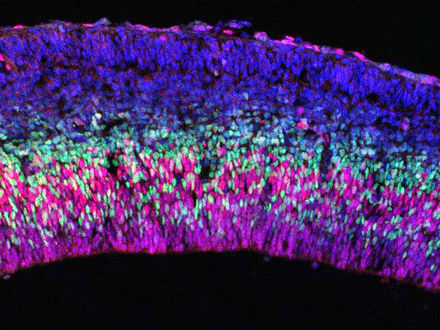Epigenetics and neural cell death
LMU researchers have demonstrated how deregulation of an epigenetic mechanism that is active only in the early phases of neurogenesis triggers the subsequent death of neural cells.

Cerebral cortex. Immunostained for Uhrf1 (neural stem cells, red)
Vidya Ramesh
The generation of neurons from stem and progenitor cells is a complex, tightly regulated process known as neurogenesis. Researchers led by Professor Dr. Magdalena Götz, Chair of Physiological Genomics at LMU and Director of the Institute for Stem Cell Research at the Helmholtz Zentrum München, have shown in collaboration with Professor Dr. Gunnar Schotta, Biomedical Center LMU, that epigenetic mechanisms which are brought into play at an early stage of neurogenesis, have an important impact on the subsequent fate of neurons.
In order to elucidate the significance of early epigenetic modifications on the development of neural cells during embryogenesis in the mouse, Götz and her colleagues specifically inactivated the gene Uhrf1. This gene is known to control a number of epigenetic functions, including DNA methylation, and is active from very early stages of neurogenesis. The methylation of specific nucleotide bases in DNA often serves to switch genes off.
Conditional knockout of Uhrf1, in a region of the forebrain, led to the activation of endogenous retroviral elements (ERV) in the genome, which are otherwise silenced by methylation. Further investigation revealed that members of the Tet family of enzymes are largely mediating the demethylation of the ERVs, thus appearing be functionally activated in the absence of Uhrf1. Moreover, these ERVs remained active not only in later stages of embryogenesis but also into postnatal stages, suggesting that their activation is non-reversible. The aberrant and ongoing activation of ERVs caused an accumulation of retroviral proteins in the affected cells and deregulation of genes and pathways. This in turn led to the progressive disruption of vital cellular processes and ultimately precipitated a massive wave of cell death.
“Our results reveal that certain key factors – such as the gene Uhrf1 – that are transiently activated only in early neurogenesis can have a crucial impact on cell fate, which may only manifest weeks later,” says Götz. “Our model system provides us with fascinating insights into these mechanisms, which are also of great interest in the context of neurodegenerative diseases.”
Original publication
Most read news
Original publication
Vidya Ramesh, Efil Bayam, Filippo M. Cernilogar, Ian M. Bonapace, Markus Schulze, Markus J. Riemenschneider, Gunnar Schotta and Magdalena Götz; "Loss of Uhrf1 in neural stem cells leads to activation of retroviral elements and delayed neurodegeneration"; Genes & Development; 2016
Topics
Organizations
Other news from the department science

Get the life science industry in your inbox
By submitting this form you agree that LUMITOS AG will send you the newsletter(s) selected above by email. Your data will not be passed on to third parties. Your data will be stored and processed in accordance with our data protection regulations. LUMITOS may contact you by email for the purpose of advertising or market and opinion surveys. You can revoke your consent at any time without giving reasons to LUMITOS AG, Ernst-Augustin-Str. 2, 12489 Berlin, Germany or by e-mail at revoke@lumitos.com with effect for the future. In addition, each email contains a link to unsubscribe from the corresponding newsletter.





















































